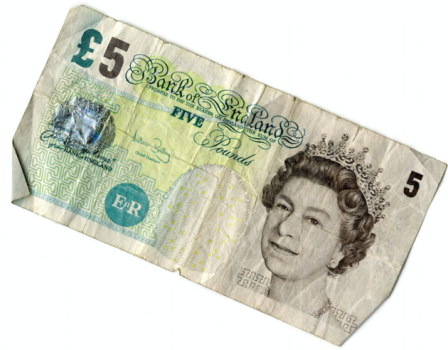Money is everywhere and yet it is difficult to describe just what it is and what it means.
Money is something that has a value
A bank note such as a £5 note is simply a piece of paper that is a promise to pay. “I promise to pay the bearer on demand” and all that. Who promises? The Bank of England promise to honour your £5 note with…… another £5 note. We know that money is something that can be swapped for itself.
Money is something that can be exchanged for goods and services
Money is split into units of currency. Goods and services in the UK are denominated in Sterling. Buying a meal with a few £5 notes certainly beats a few hours being forced to personally wash the dishes. So yes, we can swap money for meals and stuff. It’s more convenient than swapping your stuff for others stuff.
Money is safe because it’s backed by our Government?
Tightly pack £85000 into a suitcase and then lose it. It’s gone forever. Put the same £85000 in a bank that goes bust and loses it for you and it should get replaced. Well currently the first £75000 gets replaced anyway. The Government will see to that via the Financial Services Compensation Scheme. The Goverment won’t put its hand in its pocket, the surviving banks are forced to. But I guess that if just one major bank fails, we would have no confidence in the rest either. Expect anarchy and other banks to fail before you eventually get your £75000 back.
Money is issued by Government?
No, it’s actually issued by the Bank of England. Ever wondered where the Bank of England get the money from? They just make it.
They can’t just create money can they?
Yes they can and do. They set the printing presses going. Sometimes to replace old dog-eared £5 notes with new pristine £5 notes. At other times, like after the 2008 credit crisis, they simply make some more to help ease the situation. I have never met anyone who received any of that £375 billion they made though!
De La Rue do the bank note printing. Sounds foreign? Yes, we let the Frenchies print our legal tender. Unbelievably they also have a facility in nearby Westhoughton.
Ok, we can swap it and more can be created at will. What if we don’t spend our money? What if we hang on to it? What about savings?
Money is something that grows if you don’t touch it.
The current £5 note depicting the prison reformer Elizabeth Fry was first issued on 22nd May 2002. If you own one today it’s still worth just £5. So no, it doesn’t just grow in value if you don’t touch it. In fact after inflation is factored in, our 2002 £5 note’s real value in exchange for goods today has dropped to only £3.40. So it’s more accurate to say that money loses value.
However investing in real assets can make money grow in value, especially where demand exceeds supply. The same 1st issue Elizabeth Fry £5 note had a problem. The ink smeared off! Therefore they were quickly taken out of service. To buy an as new Elizabeth Fry £5 note today would set you back around £25. It’s still legal tender but now worth 5 times its original face value due to its rarity value to collectors. It’s transformed from just money into a real asset.
We could put £5 in a bank and it would grow though?
Yes. But your money doesn’t grow. Instead the bank gives you just a tiny proportion of their ill-gotten gains. Earned through market manipulation, gambling and extorting charges from those most vulnerable in society. Harsh but true.
Now eventually here is what I think money is.
Money is actually a unit of time
It used to take man all day to find enough to eat. It’s a good job Facebook wasn’t around when woolly mammoths were here along side us. Nobody would have had enough time to login. They would be just too busy trying to find enough to eat. Today it takes an average of 12.3 minutes work in London to buy one Big Mac. One 8 hour day of work therefore can give you 13 days of food. Now storing 13 days of food can be a problem, it’s far easier keeping cash rather than keeping burgers. For one, cash doesn’t require refrigeration and two, a 13 day old burger is likely to kill you.
I believe money is a store of time, of excess days worked. If a days work today gives you more than enough to survive, the excess money can be kept to one side to spend on future days when you don’t want to work. The harder and smarter you work in your life, the more excess time you accumulate. You earn time now so you can spend time later.
Here’s the conundrum
How much time is enough? When can we call time gentlemen please? Of course it varies for everyone depending on what plans you have for the future and how long that future will last. But let’s take a millionaire today as an example.
Easy Peasy to work out 30 years of time left. The average age expectancy for a couple in the UK 86. Stop accumulating now and start spending your time.
So let’s think about money as time saved.
Here’s the same example for someone already retired.
I foresee a couple of problems here. I hope you can make it all the way to 96, and indeed wish to. I hope you can continue spending £33000 per year in your final 10 years. My bet is you couldn’t.
Too much time saved
You can bank up too much time. It’s been estimated that Bill Gates has enough hours saved to fund a private army of 1 billion people for 10 years.
We will help work out your personal accumulation of time if you provide us with some personal expenditure data. We will also build in some inflation and some fund growth. Just Ask ?


Hi Howard
As always a great read?You’ve really made me look at life and the future differently,great post and look forward to our next catch up?
Hi Jonathan
Good to hear. I hope you and your family are well and I hope you are working through ‘The Chimp Paradox’. See you soon.
Howard
Great bit of common sense, I’m 51 and already thinking that way, we need to talk.
Hi Chris
Indeed we need to talk. I have many clients who just worked on for too long. They could have retired years earlier but just never did the maths.
Howard
Changed mine and Janet so much that life is better with no work. Can’t thank you enough for you advice over the years we have been clients. Regards Peter and Janet
Hi Guys
Thank you Peter. But it’s only what you deserved after hard work and hard saving. If only I could fix Man Utd!
Howard
A great analogy Howard. We appear to have too much time on our hands at our age. It’s difficult when you have spent all your life trying not to waste time and to spend it wisely.
Thanks for the good advice Howard. Jill and I need to hit the good times a bit harder and you have given us the confidence to do that.
We could call your investment portfolio “The Time Machine” or am I getting carried away now!
Hi Peter
I like “The Time Machine” ?
It’s time to hit the good times on the road to the “FA Cup Final”. Let’s hope we can share the confidence in our team.
Howard
Yes we were there on Saturday. We were sat/stood only 20 yards from Matial when he fired in the winning goal. What a fantastic moment, it made a very long day worthwhile.
We saw the Reds beat Crystal Palace last week. I think we have a very good chance come the Final.
Hi Howard, as new recruits to your world of financial good practice we have enjoyed seeing the work you have done on our behalf. We do spend a significant amount of time discussing our financial status and what plans we have for the future. Reading this blog just adds value to our decision to enjoy the time we have and to commit to spending more of the saved ‘time’ whilst we are able to enjoy it the most.
Kind regards,
Barrie and Val